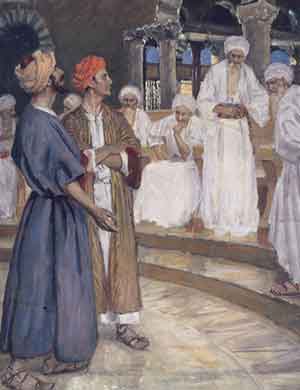
Acts of the Apostles At 4,13-21
April 10, 2021.

St. Peter and St. John before the SanhedrinI therefore feel I can recommend everyone to get an official copy and read it.
The reader, you, will be as surprised as I was when I first opened it to read up on the travels of Paolo di Tarso (Saint Paul, doctor gentium).
In my opinion the book is also a remarkable and very interesting historical-cultural testimony, of that time, even humorous and very pleasant.
Without doubt it is to be considered as a beautiful truth-novel, infinitely better than any of the fictional tales of certain popular Anglo-Saxon authors, stuffed with lies about Jesus Christ and the Catholic Church, banal and foregone if not blasphemous.
From today's passage I learn from the two Apostles that frankness and simplicity are fundamental for a Christian.
I realize that I must not be afraid to testify my Faith without mincing words, to say what for me is the truth.
I have to do it at the cost of appearing naive and 'simple' as Peter and John were in front of the wise men of the Jerusalem SANHEDRIN, those who had condemned Jesus Christ to death and demanded Him to be crucified.
When it comes regarding my Faith, even if I have to use the virtue of prudence and discernment, that is
nolite dare sanctum canibus, neque mittatis margaritas vestras ante porcos («do not give holy things to dogs, nor throw your pearls at porks») MT (7, 6)
in case I happen to bear witness to my faith I must not have human respect or fear the judgment of anyone, because what really matters is the judgment of Jesus Christ.
"Whoever therefore recognizes me before men, I will also recognize before my Father who is in heaven; but whoever denies me before men, I will also deny before my Father who is in heaven" Mt 10: 32-33
Before speaking I have to ask God for help, because I am not at all without defects, in particular I do not think I am a meek and person of humble character, and sometimes I have had to hold back my arms in order not to respond violently to certain unpleasant teasing.
But if this is the maximum that one can normally expect and if no one wants to kill or physically harm you, for the sake of Jesus Christ you can also allow yourself to be indifferent to certain offenses, indeed you must be happy with them.
By clicking this link we can read a note by Lino Bertuzzi entitled: The world of Acts or THE HISTORICAL ENVIRONMENT IN THE ACTS OF THE APOSTLES.
The Acts of the Apostles are a text contained in the New Testament, written in ancient Greek. Its final draft probably dates back to around 80-90, but some think they were written between 40 and 70 AD.
Christian tradition attributes it to Luke, Paul's collaborator and author of the Gospel according to Luke.
The book is 28 chapters and tells the story of the Christian community from the ascension of Jesus (1,6-11) to the arrival of Paul in Rome (28,16), covering a period that goes from approximately 30 to 63 AD. In addition to Paul, the work focuses extensively on the work of the apostle Peter.
The book describes the rapid development, expansion and organization of Christian witness first among the Jews and then in the nations bordering the Mediterranean.
CANONICITY:
The tradition of the ancient church agrees in attributing both the Gospel according to Luke and the Acts to Luke.Irenaeus of Lyons (Against the heresies 3,14,1; 15,1) states that Luke, a disciple of Paul, recounted his travels with Paul in Acts; the Acts also attribute the Acts to Luke also Tertullian (Against Marcione 4.2.2), Clemente Alessandrino (Pedagogo 2.1.15 and Miscellanea 5.12.82) as well as the 2nd century Muratorian fragment.
The Michigan 1571 manuscripts of the third century and Chester Beatty I (about 250), one of the oldest extant New Testament manuscripts, contain parts of the book of Acts.
The biblical book of Acts therefore circulated in the early centuries as part of the catalog.
ACTS At 4,13-21
In those days, the leaders, the elders and the scribes, seeing the frankness of Peter and John and realizing that they were simple and uneducated people, were amazed and recognized them as those who had been with Jesus. near them, the man who had been healed, they did not know what to reply.
They brought them out of the Sanhedrin and began to consult among themselves, saying: «What must we do to these men? An obvious sign came from them; it has become so well known to all the inhabitants of Jerusalem that we cannot deny it. But so that it does not spread more among the people, we forbid them with threats to still speak to anyone in that name ».
They called them back and ordered them not to speak in any way or to teach in the name of Jesus. But Peter and John replied: “Whether it is right before God to obey you instead of God, you judge him. We cannot be silent about what we have seen and heard ».
Those then, after having further threatened them, not finding how to punish them, let them go because of the people, because they all glorified God for what had happened.
